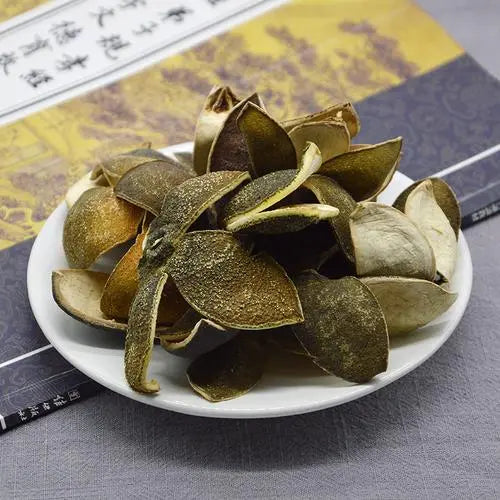Qi medicine
Drugs whose main function is to regulate qi and are often used to treat qi stagnation and qi inversion caused by qi imbalance are called qi-regulating drugs, also known as qi-moving drugs. Among them, those with strong qi-moving power are also called qi-breaking medicines.
This type of medicine has a bitter, warm and aromatic nature and flavor, and is mainly directed to the spleen, stomach, liver and lung meridians. The pungent fragrance can be dispersed, the taste is bitter and can be relieved, and the warmth can be circulated, so it has the effect of regulating the qi mechanism, and can achieve the effects of relieving pain, dispersing stagnation, and reducing indigestion by regulating the qi mechanism. It is mainly used to treat qi stagnation and qi inversion caused by qi imbalance. Due to the different action sites and characteristics, they have the effects of regulating qi and invigorating the spleen, soothing the liver and relieving stagnation, regulating qi and widening the chest, promoting qi and relieving pain, breaking qi and dispelling stagnation, reducing adverse flow and relieving vomiting. It is respectively suitable for the treatment of abdominal distension and pain, belching and acid regurgitation, nausea and vomiting, diarrhea or constipation caused by stagnation of spleen and stomach Qi; distending pain in hypochondrium and ribs caused by stagnation of liver qi, depression, hernia pain, breast distending pain, irregular menstruation, etc. ; Chest tightness, chest pain, coughing and asthma caused by stagnation of lung qi.
This type of medicine is pungent, warm, fragrant and dry, and can easily consume qi and damage yin, so those with insufficient qi and yin should use it with caution.
green skin
It was first recorded in Ben Cao Tu Jing.
This product is the peel of the young or immature fruit of the Rutaceae plant Orange and its cultivated varieties. From May to June, the young fruits that have fallen off are collected and dried in the sun, which is commonly called "Geqingpi"; from July to August, the immature fruits are harvested, and the peel is cut into four parts longitudinally to the base, and all the pulp parts are removed. Dried in the sun, it is commonly called "Sihua Qingpi". One-flowered green bark has a fragrant smell and a bitter and pungent taste. The ones with dark green color, uniform size, hard texture and strong aroma are better. Four-flowered green bark has a fragrant smell and tastes sour, bitter and pungent. The ones with black-green skin, yellow-white inner surface and strong aroma are better. Better. Use raw or roasted in vinegar.
[Medical properties] Bitter, pungent, warm. Returns to the liver, gallbladder, and stomach meridians.
[Efficacy] Soothing the liver and breaking the qi, eliminating accumulation and stagnation.
【application】
1. Liver stagnation and qi stagnation, chest and hypochondrium pain, hernia pain, and mastitis
This product is bitter, pungent, warm and unblocking, has a strong property in the liver, is good at soothing and regulating the liver and gallbladder qi, and is especially suitable for syndromes of liver stagnation and qi stagnation.
2. Food stagnation, gas stagnation, abdominal distension and pain
This product is pungent and reduces pain, which can not only eliminate accumulation, but also promote qi and relieve pain.
3. Accumulation of lumps in the abdomen, long-term malaria mass
This product is bitter and strong, has pungent and warm properties, and has strong tonifying power. It can break Qi and dissipate stagnation.
[Usage and Dosage] Decoction and take, 3~10g. Sunburn with vinegar enhances the power of soothing the liver and relieving pain.
[Usage Precautions] This product is strong in nature and consumes qi, so people with qi deficiency should use it with caution.
[Identification of medication]
Both tangerine peel and green peel can regulate the qi in the middle burner and relieve swelling, and are used for symptoms such as epigastric distension and pain due to stagnation of spleen and stomach qi, and food accumulation that cannot be digested. However, dried tangerine peel has a mild nature and tends to return to the spleen and lungs. It focuses on regulating the qi of the spleen and lungs, and is especially good at regulating qi. It is very effective in treating abdominal distension, nausea, vomiting, and hiccups caused by dampness and qi stagnation. It is also good at drying dampness and resolving phlegm. An important medicine for treating damp phlegm and cold phlegm; Qingpi is strong in nature, preferentially enters the liver and gallbladder, and favors liver and gallbladder qi. It is good at soothing the liver and depleting qi, and can eliminate accumulation and stagnation. It is mainly used to treat breast swelling, pain, agglomeration, and hypochondria due to stagnation of liver qi. Rib swelling and pain, hernia pain, abdominal pain due to food accumulation, accumulation of symptoms, etc.

